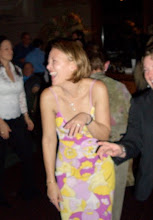Even more intimidating than picking up Leo Tolstoy's War and Peace is attempting, as an amateur blogger, to review it. This is an amazing book, difficult to put down and enjoyable from start to finish. I chose the 2007 translation by Richard Pevear and Larissa Volokhonsky, a husband and wife team who has done a phenomenal job of translating a number of Russian classics. I don't anticipate ever reading another translator's edition of any Russian novel - they breathe new life into these wonderful books.
At nearly 1300 pages, War and Peace truly defines the epic genre. It is set primarily among Moscow and Petersburg nobility during the period of the Napoleonic wars (1805-1812), and it tells the story of two very different families and one unique man, interwoven with the politics and strategy of the wars themselves. Severe old Prince Bolkonsky has two children, the intelligent and thoughtful Andrei and the religious Marya. The laid back Count Ilya Rostov and his loving wife have four children, Vera, Nikolai, Natasha and Petya, and an orphaned niece Sonya. Count Pierre Bezukhov is the favorite illegitimate son of one of Moscow's richest men, and his inherited fortune throws him into society life for which he is ill prepared.
The beautiful Natasha Rostov is introduced as a 13-year-old girl, the favorite child of both her parents. She is impetuous and charming, and everyone she meets becomes captivated. This only increases as she makes her own debut into society. She has become friendly with Pierre Bezukhov, a frequent visitor to the Rostov household, who introduces her to the handsome soldier Prince Andrei Bolkonsky at her first ball. The evolution of the relationships between Natasha, Pierre and Andrei provide much of the background for the social stories throughout the book. Their families and friends - and members of greater Moscow and Petersburg society - provide a robust cast of characters so well developed and compelling you'll miss them when you finish the book.
Beyond his complex storytelling, Tolstoy uses the book to promote his thoughts on the origins of war, the roles of leaders, the true source of happiness, and other intricate philosophies. He also makes it very clear which generals he felt should be credited with Russian victory, and where the blame should lie when the opposite was true. By using real wars and battles as the backdrop for human dramas, he provides great insight into how the characters lives are shaped, and what drives them to make the decisions they do. This is true not only for the fictional characters he has created, but also for the generals and other historical figures that feature prominently.
I could not have been more thrilled with the experience of reading War and Peace. It is a interesting and exciting and meticulously crafted... I only want to re-read my other favorite Russian novels to fairly assess whether it is the best book I have ever read, or merely one of the best. It is admittedly a massive undertaking, but one that will be well worth it when you have the time to invest.
Up next: Elaine Dundy's The Dud Avocado, the story of a 21-year-old American woman dropped into 1950s Paris for sexy and boozy adventures. Supposed to be really funny, plus it's got a cool title.
Wednesday, October 28, 2009
War and Peace
Labels:
highly recommended,
literature
Subscribe to:
Post Comments (Atom)


No comments:
Post a Comment